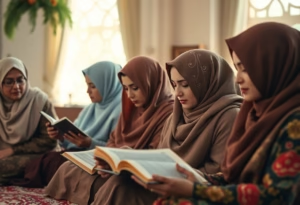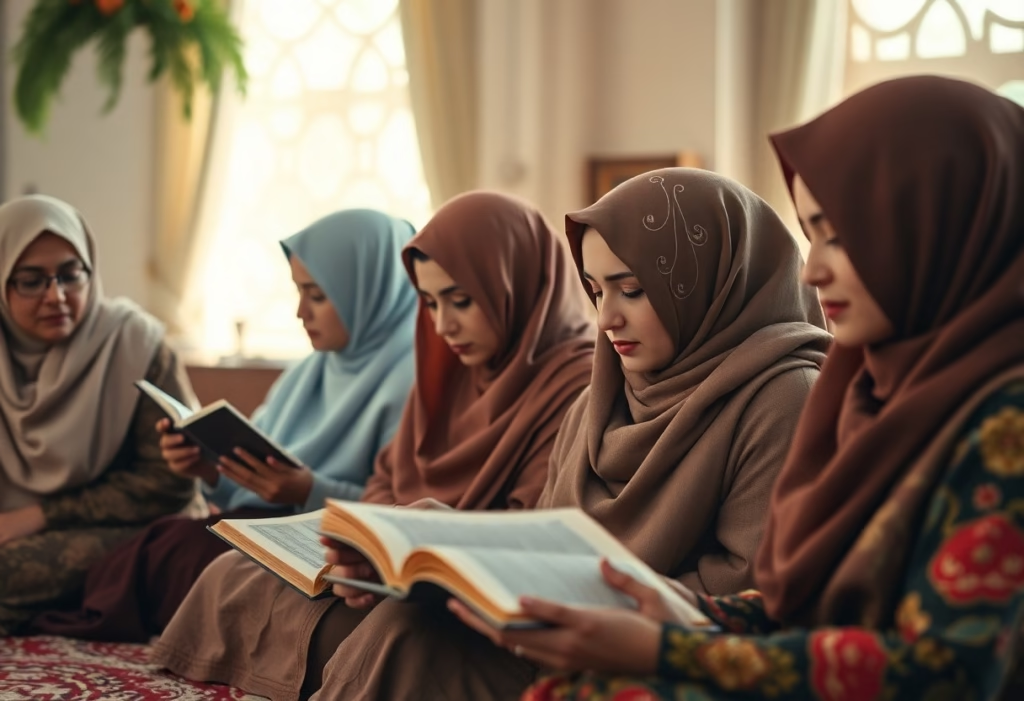Most people carry misconceptions about the role and rights of women in Islam based on cultural interpretations rather than the Qur’an itself. It’s important for you to explore the text to uncover its empowering messages and fundamental rights granted to women. You’ll find that the Qur’an speaks to women’s dignity, their role in society, and their spiritual equality alongside men. Join us as we research into the verses that highlight these important aspects and challenge common stereotypes.
The Qur’an’s Direct Teachings on Women
The Qur’an provides a framework for understanding women’s roles in both spiritual and societal contexts. Its verses emphasize equity, dignity, and respect, outlining rights and responsibilities applicable to both genders. In several instances, women are acknowledged as individual agents with their own spiritual and moral accounts. This recognition positions women not merely as supportive figures but as integral parts of community life and religious practice.
Key Verses Celebrating Women’s Rights
Several verses in the Qur’an explicitly affirm women’s rights, such as their right to inheritance, education, and participation in social matters. For instance, the verse in Surah An-Nisa (4:32) proclaims that both men and women are responsible for their own actions and will be equally rewarded. Such teachings lay the groundwork for advocating gender equality within Islamic communities.
The Role of Women in Religious Texts
Women play pivotal roles in various narratives throughout the Qur’an, illustrating their strength and resilience. Figures such as Maryam (Mary), who is honored as the mother of Isa (Jesus), exemplify virtue and devotion. The Qur’an recounts stories of influential women like Khadijah, the Prophet Muhammad’s first wife, who was a successful businesswoman supporting the early Muslim community. These portrayals challenge the notion of women as passive recipients of faith, instead presenting them as active participants in shaping religious history.
Misinterpretations and Cultural Context
Cultural misinterpretations often distort the teachings of the Qur’an concerning women. This often stems from patriarchal norms that pervade various societies, leading to a conflation of cultural practices with religious doctrine. Your understanding of women’s rights in Islam must differentiate between the Qur’an’s messages and how those messages have been filtered through cultural lenses, which can sometimes misrepresent or limit women’s roles based on societal expectations rather than divine instruction.
Historical Uses of the Qur’an in Gender Dynamics
Throughout history, the Qur’an has been referenced in support of both progressive and restrictive views on gender dynamics. Various interpretations have been exploited to reinforce traditional gender roles, sometimes depicting women as subordinate. Instances of selective verses being emphasized illustrate how certain communities have used the text to justify differential treatment of women, often ignoring the broader context and intended equality established in the Qur’an itself.
Distinguishing Cultural Practices from Religious Doctrine
Understanding the distinction between cultural practices and religious doctrine is vital for a fair interpretation of the Qur’an’s teachings on women. Many customs labeled as Islamic stem from local traditions rather than authentic Islamic tenets. For instance, practices such as forced marriage or gender segregation are often rooted in cultural norms, rather than Qur’anic commands. You must scrutinize the origins of these practices, recognizing that they may not reflect the spiritual principles upheld in the Qur’an. The text establishes a clear framework advocating for women’s rights, which can become obscured when viewed through the lens of entrenched cultural biases.
Women in Islamic History: A Paradigm Shift
Rethinking women’s roles in Islamic history reveals a rich tapestry of contributions and influence that have often been overlooked. From the inception of Islam, women have played crucial roles, not just as followers but as leaders, scholars, and advocates for change. This shift in understanding helps you appreciate the integral part women have taken in shaping Islamic traditions and societies, challenging many prevailing misconceptions.
Prominent Female Figures in Early Islam
Among the luminaries of early Islam, figures like Khadijah, the Prophet Muhammad’s first wife, stand out for her business acumen and support for his prophetic mission. Aisha, another prominent figure, was instrumental in the transmission of hadiths and offered significant political insight during the formative years of the community. These women’s contributions serve as paramount examples of female empowerment within the Islamic narrative.
The Influence of Women on Islamic Society
Women significantly shaped Islamic society through their diverse roles as leaders, educators, and cultural custodians. Their involvement extended beyond the household, as many women established schools, participated in economic activities, and influenced political decisions. For example, the contributions of scholars like Fatima al-Fihri, who founded the world’s first university in Morocco, reflect how women have historically been at the forefront of learning and cultural advancement. The legacy of these women offers you a broader understanding of how Islamic society has evolved, encouraging the recognition of female voices and their pivotal roles in history.
Contemporary Perspectives: Reclaiming the Narrative
As the discourse surrounding women’s rights and interpretations of sacred texts evolve, contemporary Muslim women reclaim their narratives by actively engaging with the Qur’an. This entails a critical examination of historical context and a dynamic interaction with religious teachings. You’ll find that these modern interpretations challenge long-held misinterpretations, shifting from a patriarchal lens to one that emphasizes equality, empowerment, and justice for women within the framework of Islamic teachings.
Modern Muslim Women’s Voices and Activism
Voices of modern Muslim women are resonating globally as they advocate for their rights and reinterpret Qur’anic teachings. Activists like Malala Yousafzai and Amani Al-Khatahtbeh are just two examples of individuals leading the charge, emphasizing education, equality, and social justice. You can witness how platforms and organizations are emerging, allowing women to share their stories, articulate their struggles, and celebrate their achievements in a context that honors their faith while promoting gender equity.
Transformative Feminist Readings of the Qur’an
Transformative feminist readings of the Qur’an research deep into the text, extracting meanings that empower women and challenge historical patriarchy. Scholars like Amina Wadud advocate for a nuanced approach, arguing that the platform for women’s rights exists within the Qur’an itself—if only the texts are interpreted through a contemporary lens. You’ll discover how these readings highlight themes of justice, compassion, and fairness, underscoring opportunities where women’s voices can be amplified, leading to a renewed understanding of their roles in both familial and societal contexts.
Transformative feminist readings seek to reframe traditional interpretations by focusing on the principles of gender equality embedded within Islamic texts. They highlight verses that advocate for mutual respect and partnership between genders, pushing back against patriarchy. This work is important because it not only fosters an inclusive environment for women but also encourages the larger Muslim community to reconsider the implications of their faith in contemporary society. By utilizing historical context and critical analysis, these readings challenge you to rethink previously accepted narratives and recognize the Qur’an’s potential as a source for feminine empowerment and social justice.
The Intersection of Faith and Gender Equality
The teachings of Islam provide a framework that inherently supports gender equality. By emphasizing the dignity of all individuals, the Qur’an encourages followers to seek justice and respect for women. Through progressive interpretations, contemporary Muslim scholars have advocated that religious mandates align with global movements for women’s rights, fostering a richer understanding of women’s roles within society.
How Islamic Teachings Align with Global Gender Rights
Islamic teachings advocate for the fundamental rights of women, promoting their access to education, health care, and economic opportunities. Many verses in the Qur’an and Hadith empower women, encouraging you to challenge societal norms that hinder progress. Through various initiatives, Muslim communities are advocating for equal rights that resonate with international human rights standards, demonstrating that spirituality and equality can coexist.
Challenging Stereotypes Through Scriptural Insights
Insightful readings of the Qur’an reveal misunderstood roles of women. Often, verses are taken out of context, leading to widespread misconceptions. An in-depth study of these teachings shows that women are valued not just as mothers or wives but as individuals with distinct identities and contributions. Historic examples of female leaders within the Islamic tradition reflect a progressive ethos that contradicts the stereotypes perpetuated in today’s media narratives.
| Misconceptions | Clarifications |
|---|---|
| Women are oppressed in Islam | Many teachings emphasize their value and rights. |
| Women cannot hold leadership roles | Historical figures like Khadijah and Aisha were influential leaders. |
| Islam promotes gender segregation | Many traditions feature both men and women participating together. |
| Women’s primary role is domestic | The Qur’an supports women’s involvement in public life. |
| Interpretations are static | Modern scholarship offers new insights promoting equality. |
Challenging stereotypes requires engaging with the textual and historical context of the Qur’an. Emphasizing the dynamic roles women have played narratively and practically in early Islamic history can shift perceptions. Focusing on female participation in education, commerce, and governance throughout history serves as a counterpoint to contemporary stereotypes. You will find that these teachings not only inspire women but also encourage men to adopt a more equitable view of gender dynamics. After considering these insights, it becomes clear that the narrative of women in Islam is much richer and more empowering than commonly portrayed.
- Islam teaches gender equality through its principles.
- Women’s rights align with global standards.
- Challenging stereotypes enables societal progress.
- Historical examples validate women’s leadership.
- After examining scriptural insights, you can effectively counter prevailing misconceptions.
Conclusion
As a reminder, understanding what the Qur’an truly says about women is imperative for grasping the complexities of gender roles within the Islamic faith. You may find that the scripture advocates for respect, equality, and the recognition of women’s rights, providing a rich foundation for their status in society. Engaging with these texts deeply can enhance your appreciation for the diverse interpretations and the ongoing discussions surrounding women in Islam today.


